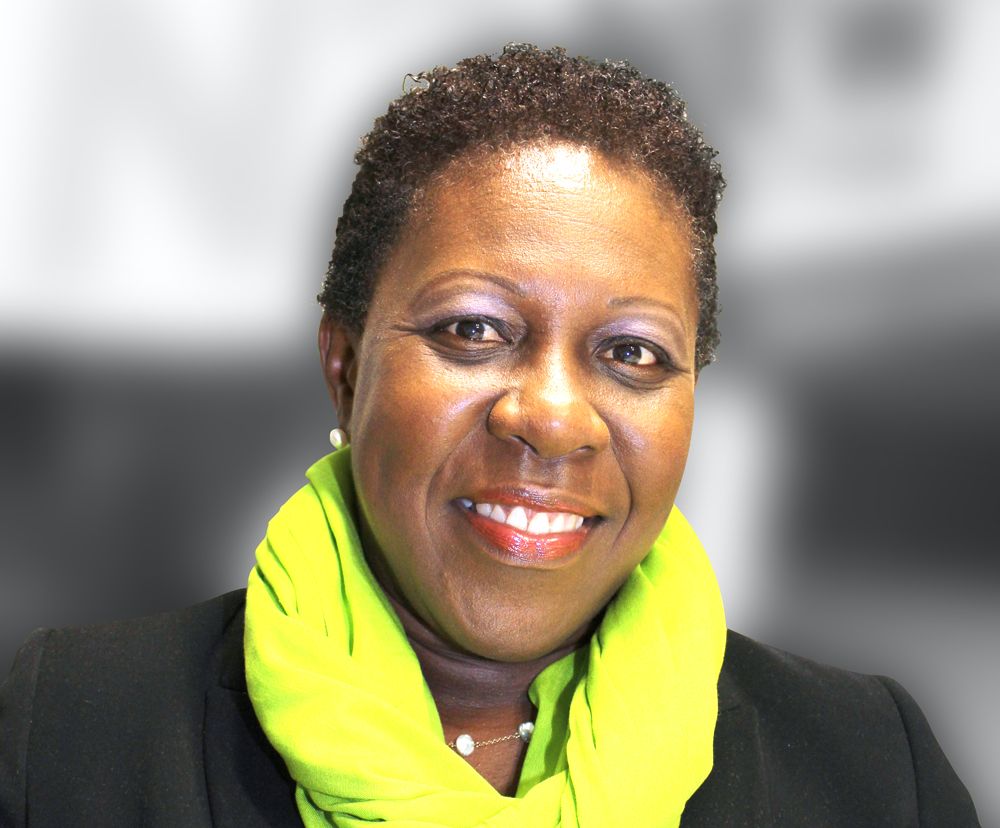Elections COM 2017 : interview of Jeanne Vanterpool, leader and head of the New Direction list
♦ How did you decide to run (again) in the territorial elections?
Participating in an election, particularly in the Saint-Martin territorial elections, is first and foremost an act of bravery, a courageous act. You must wish to serve the "country" as well as the "people." For my part, I had that "call from a despairing country." And after fully understanding the issues at stake, I asked the opinions and got the consent of my family (particularly, my young son and my husband). You also need support from friends and the encouragement of a large part of the Saint-Martin population, which are also some of the main motivators.
♦ We currently talk a lot about the Saint-Martin identity, as many Saint-Martin residents feel they have lost it. As a Saint-Martin resident, do you share this feeling? Do you feel you have lost your identity?
Before engaging in such considerations, there are questions we need to ask ourselves as we are called to manage, administrate and govern a territory with Saint-Martin’s social and environmental dimensions. The first question I ask myself is as follows: How are others similar or different from me? Knowing the weight of the question of identity in the process of development of the territory of Saint-Martin, I do not want to separate the Identity question from the Cultural question, or from the question of heritage. The fact is that it has been a very long time since true, solid public policies have not been implemented in these three areas, which naturally gives us the feeling of having lost a Saint-Martin identity.
What we have lost is our pride in being what we have always been and what we continue to be. This is why we need a true reflection and true public debate on this question in order to resolve it. It is time to interrogate the question about our views of the Other, and thus about our relationship with the Other, in order to finally lay a foundation for the construction of the Country of Saint-Martin/Sint-Maarten.
♦ For the past several months, there have been some very nationalistic sentiments. While on the mainland such ideas are denounced as a danger to society, here we tend to entertain them. According to you, is this less dangerous locally?
Here, we talk about "nationalist thought" and quickly make connections to the mainland, where racism and antisemitism are displayed by a certain political party and its leader who are well-supported by a large number of French citizens, both in Paris and overseas. I have noticed, not without astonishment, that this phenomenon is only denounced for electoral reasons and for none other.
Here in Saint-Martin, these ideas are not more upheld than in Martinique with the MIM (Mouvement Indépendantiste Martiniquais of Alfred Marie-Jeanne, current President of the Collectivité). What is certain is that the void left by Saint-Martin’s political leaders, our choice to turn our backs on our heritage and on the cornerstones of our culture, and particularly the lack of any debate, should be considered as the cause of the "danger," if there is any danger.
♦ We always hear that economic development should be a priority because it will create jobs, wealth, etc. Although the tax policy is attractive, it is rare to find investors interested in coming to Saint-Martin. In light of the unemployment figures, all the actions carried out so far have been a failure. If you are elected in March, what measures will you implement to create jobs? With what goals?
Although it is true that economic development constitutes a very important element in the management, administration, and governance of Saint-Martin, economics aren’t everything. And in this period, there are many candidates that claim to have finally found the miracle recipe, or the magic bullet, to create wealth and at the same time create jobs for the 4,345 job seekers registered at the employment center. After having tried everything, or nearly, we ask the following questions.
Can we reasonably and effectively combat unemployment and create (preferably long-term) jobs while never thinking about those that our society first created, and then excluded, and who left the educational, training, or apprenticeship system without graduating and with no qualifications? In sum, those who are victims of long-term unemployment.
Should tourism be the sole possible pillar of economic development? This obligates us to consider the "Seaside Project,” the construction of hotels, and the increase in number of beds.
Isn’t the Art and Culture sector, which some call "fund consuming," a niche for guaranteed jobs that value our young artists and creators?
Isn’t agriculture (both animal and vegetable), which never benefited from a proactive public policy, also a gold mine for creating wealth and employment?
If elected in March, I will open the many drawers filled with innovative projects likely to provide clear responses and sustainable solutions to Saint-Martin’s employment problem, including information technologies, the renewable energy sector, language laboratories, etc.
♦ In terms of employment specifically, many people, including you, want to give priority to residents of Saint-Martin. This may seem fair, but we must be realistic and admit that there is a lack of skills locally, especially for senior positions. In your opinion, how can this be remedied? How can we train younger and older employees in the territory during their careers so they can advance?
When considering what to implement in order to effectively fight unemployment in Saint-Martin, we ask ourselves how. Although it is possible to reduce the overall unemployment rate in Saint-Martin, it seems more difficult to reduce unemployment for one category of people: those who have been excluded from the job market for many years. The category of those who have dropped out of school and have no qualifications, no diplomas, and no mastery of the fundamentals of reading, writing, and counting. It is true that, very often, when we talk about prioritizing employment for the people of Saint-Martin, most candidates are far from the realities in the territory and lack relevance and realism. Faced with this unfortunate fact, the trio of training-education-qualification is the answer.
But to return to the question of management positions and the lack of local skills to fill management positions and skilled labor, allow me to rebel against that idea and disagree. Many people continue to make us believe it, but it is not true. The problem is that many of these individuals have not been encouraged to return. In fact, we have many highly-qualified young people with diplomas and skills on the island, who are unable to access qualified work for reasons that are often beyond us.
There are also many highly-qualified professionals from Saint-Martin with American, Canadian, British, and other degrees that cannot return home to Saint-Martin. We must facilitate the required steps and regulations on Saint-Martin that allow individuals with an equivalent qualification to work here.
We also must provide the necessary motivation and encourage a change in policies and behaviors to encourage young professionals working in the private sector to return home. Those with diplomas but no experience must be guided through on-site apprenticeship and training programs.
But even more important is that we need to stop the educational cycle that ends in an impasse for our youth. In the short term, we must take advantage of opportunities and create occasions to reach qualified positions and which could provide a path to a real career by collaborating more closely with employers. We also need to get those interested in our territory (who want to invest in Saint-Martin) to agree to promote local employment of our population and our youth, in exchange for incentives (tax benefits and other advantages) by implementing a charter of local employment.
♦ As for education, the observation made over the past several years is alarming: the level is very low. For several reasons: problems at the level of the language, lack of involvement of parents in their children's education, etc. According to you, what is the first obstacle to the success of our children? And how can you remove it?
It’s true that our Collectivité does not have jurisdiction in all areas of the daily life of its citizens. However, when it comes to education and schooling, nothing should be neglected, and that’s what we have done to this day. I note that since 2007, we have always had professionals and educational and instructional actors in the best political places in Saint-Martin.
♦ Concerning the development of Marigot Bay, the current majority’s plan seems not to have attracted many investors. Some have already learned from this and want a smaller-scale project. What is your position on this development? (Is it necessary or indispensable?)
As the current president of the Office of Tourism, I have asked myself many questions over the past five years. I also worried a lot when I saw that we did not manage to reach agreements among the 23 members of the Territorial Council and a large part of the professionals in the field.
Such a project is indispensable and also necessary to pursue developing our territory in this domain. However, it also seems necessary to me to seek the expertise of specialists and professionals in the sector.
♦ In tax matters, it is difficult for the Collectivité to collect all taxes. It is also difficult for taxpayers to pay taxes, so for years, they did not. Unpaid taxes totaled more than €20 million last year to the Collectivité. In your opinion, how can the system be more effective? Should we remove taxes? Lower the rate of certain taxes to motivate people to pay?
Paying taxes has never been the most appetizing dish from the menu of families. Taxes are explained and justified when they are "just" and used well. Be wary of promises!
♦ For several years, ecology and more broadly the environment have been more and more important in both national and international political discourse. There was the Grenelle Environment Forum, and then recently the COP 21 and 22. Here in Saint-Martin, this topic is missing from debates. Don’t you think, however, that the environment should be the common denominator of all considered and proposed actions?
The planet is entrusted to those who live on it, but it will never stop belonging to those who are born each day and those who will be born in the future, year after year.
All that we need to do is to be fully aware and go ever further by involving young children more from the earliest age.
♦ Everyone agrees to a cleanup of the island. Here, garbage is picked up every day, which is not the case elsewhere, even overseas, in such a small territory. What should be implemented to make the island even cleaner?
In the first place, we need to take on a large clean-up and beautification campaign for the island. However, a clean-up campaign that is not accompanied by solutions to fundamental questions of cleanliness makes very little sense. If we continue to have garbage cans in our streets that don’t hold household trash and other garbage, that makes no sense. If we don’t have regulations, adequate equipment, and a plan aiming to maintain cleanliness, we will be in the same position a week after the clean-up project.
We must ensure that our streets are clean and remain clean because this is a service that we are committed to providing to Saint-Martin's citizens and taxpayers. We must introduce a true reform that includes a study of a recycling system that begins at the residential level through selective sorting. The large garbage "boxes" on the street across from properties should be removed and replaced with personal garbage cans for which individual homeowners should be responsible. There should be a return to regulations setting the time that garbage can and should be taken out.
Strict criteria for those who have contracts for trash collection and those in charge of waste disposal and street cleaning should be implemented, in terms of responsibility and the quality of the work carried out.
Moreover, there should be an education campaign to inform the population about the advantages of a healthy environment and a clean territory. With the collaboration of neighborhood councils, we want to beautify neighborhoods and find solutions.
The best way of maintaining cleanliness in the short term is to educate and raise the level of neighborhood pride among each community and to hold service providers and residents responsible for their acts.
♦ Who would you like to face in the second round on March 26?
In the second round, I would like to face the candidate who, like me, knows and loves Saint-Martin; the candidate who, like me, wants to serve the interests of Saint-Martin; he or she who wants to defend the interests of all segments of the population, in all its great diversity. I would prefer to face the candidate who, like me, knows how to anticipate, decide, resist and apply, so that Saint-Martin is the true winner.
♦ Finally, what question would you have liked to be asked?
What will I do the day after March 26, in case of a victory or a defeat for the New Direction list that I am leading? I would have very much liked to be asked that question.
Download the interview:







